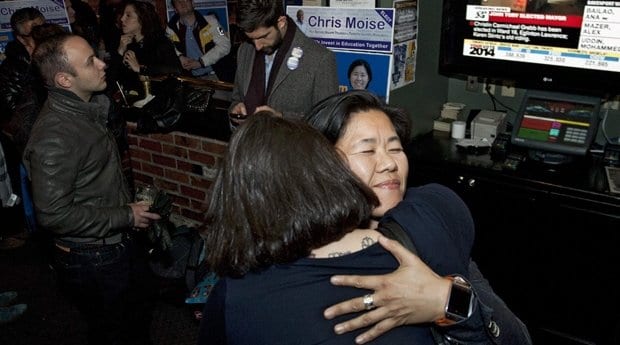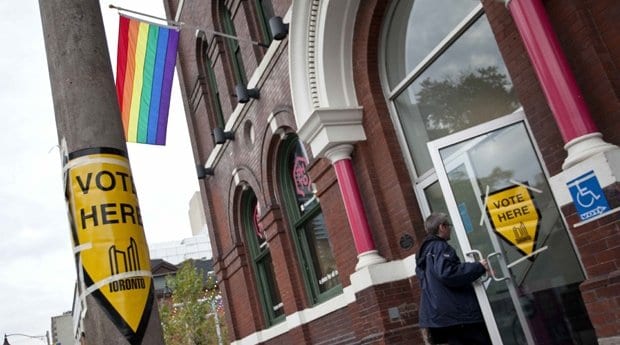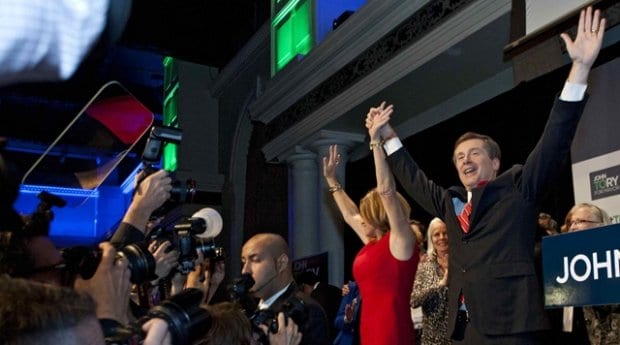
Councillor Kristyn Wong-Tam embraces her communications director Lisa Hoffman at Wong-Tam’s reelection party. Credit: Nick Lachance

The polling station at the 519 Church Street Community Centre. Credit: Nick Lachance
For a few tense minutes, John Tory supporters at his election night party watched while he maintained a solid, but not as wide as they expected, lead over Doug Ford.
But 26 minutes after the polls closed, the CBC and other major news networks declared what polls had predicted all summer — Tory was elected mayor of Toronto. He walked away with 40.3 percent of the vote, with Doug Ford trailing with 33.7 percent and Olivia Chow in a distant third, with 22 percent.
“Tonight we begin the work of building one Toronto,” Tory told supporters during his victory speech. For the LGBT community in attendance, it was a relief to see someone win who doesn’t shy away from the Church-Wellesley Village. Jordan Allison and Justin Smith, two Tory campaign volunteers, said they saw him on a campaign visit at Woody’s bar on Saturday night and were impressed that he could name some of the drag queens there from memory.
However, Tory’s win almost certainly means there is a battle on the horizon for the LGBT community — he has publicly stated, on multiple occasions, that he would vote to end Pride’s city funding if Queers Against Israeli Apartheid (QuAIA) marched in the parade.
“One hopes that those comments were simply a crass appeal for rightwing votes,” says QuAIA member Tim McCaskell. He says that just because Tory is now mayor he can’t overrule the decision of the city solicitor or manager, who had previously determined that use of the phrase “Israeli apartheid” does not violate the city’s discrimination policies. “You can’t just decide that I’m going to decide what free speech means.” QuAIA has no plans to protest — for now. McCaskell notes that Pride is still a long way away.
Ward 27, the home of the Church-Wellesley Village, voted overwhelmingly in favour of Tory; he received approximately 57 percent of the vote there. Voter turnout was high citywide — just over 60 percent, according to Global News, about 10 percent higher than the 2010 election. John Clifford, one of the organizers of ProudTOVote, a non-partisan organization dedicated to getting the LGBT community out to the polls, says that turnout in Ward 27 was higher this year.
“We were able to reach hundreds of thousands of people in Toronto, both within our community and outside of the community,” he says. Though there is no way to measure how many in the LGBT community voted, Clifford notes, he believes ProudTOVote made a difference.
Ward 27 incumbent Kristyn Wong-Tam won a decisive victory — she received 62.5 percent of the vote, far higher than her closest opponent, Megan McIver, with 17 percent of the vote.
At her victory party at Mick E Fynn’s on Carlton Street, Wong-Tam jumped right into talking about priorities in the ward. “We’ve started some extraordinary work in the Village that you’ve already started to see,” she said, citing the renovation of Barbara Hall Park and the Church Street Mural Project. “The next term will be focusing on building on top of that, including better street modifications [and] improving the pedestrian feel of the environment.”
Queer candidates Jane Farrow in Ward 30 and Bobby Beckett in Ward 18 both lost their races, to incumbents Paula Fletcher and Ana Bailão, respectively.
Aidan Johnson, an openly gay lawyer, was elected to Ward 1 in Hamilton, thereby becoming the first LGBT member of Hamilton’s city council. In Ottawa, Catherine McKenney became the first openly queer woman elected to that city’s council, replacing the retiring Diane Holmes in Ward 14-Somerset.
Several politicians who have come under scrutiny from the LGBT community for past actions were elected. Jim Karygiannis, who as a Liberal MP voted against same-sex marriage and a bill that would include trans people in the Canadian Human Rights Act, was elected to Ward 39 in Toronto. He told Xtra earlier this year that those issues are dead for him and shouldn’t cause LGBT people any concern.
The Toronto District School Board saw significant change during an election when all but one Toronto incumbent held their council seats. Trustee Sam Sotiropoulos, who wanted to ban nudity at Pride and tweeted that he reserves the right not to believe in transgenderism, lost his seat, along with Harout Manougian, who, Xtra revealed earlier this year, had written a letter decrying gay marriage while he was in university — a letter Manougian later distanced himself from.
Elected to the board was progressive candidate Ausma Malik, who bore the brunt of several Islamophobic and sexist attacks during the campaign, and Michael Ford, the nephew of Doug and Rob Ford, who quickly took an opportunity to differentiate himself from Sotiropoulos. “I think everyone — it doesn’t matter your sexuality, your race — everyone should feel included and welcome in our school system,” he told Xtra at the Ford’s election night party at the Woodbine Banquet Hall.
With the election over, people will be watching closely for Tory’s next move. The ward-by-ward breakdown indicates that Tory carried wards with high-income populations, while Ford carried predominantly wards with low-income populations (Chow carried three of the downtown wards). With these divides in place, it’s time to see how Tory will carry out his goal of creating “one Toronto.”
With files from Rob Salerno and Nick Lachance.


 Why you can trust Xtra
Why you can trust Xtra


